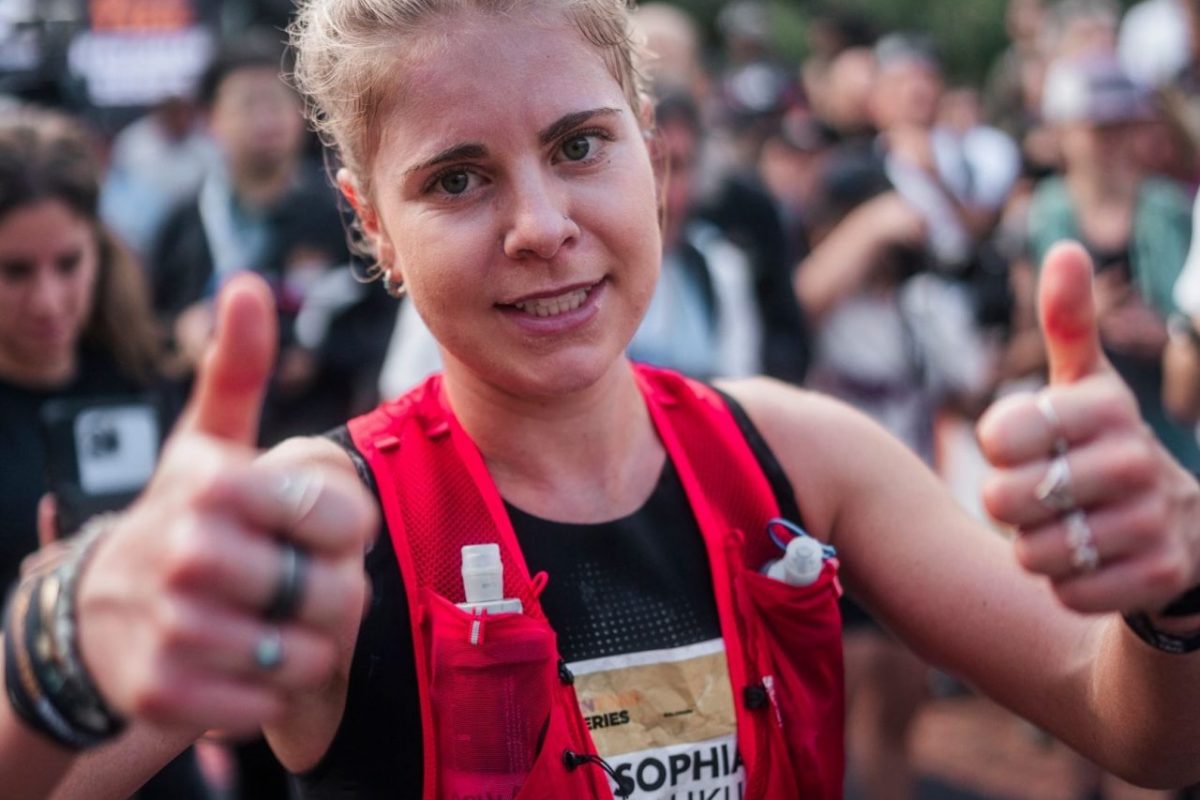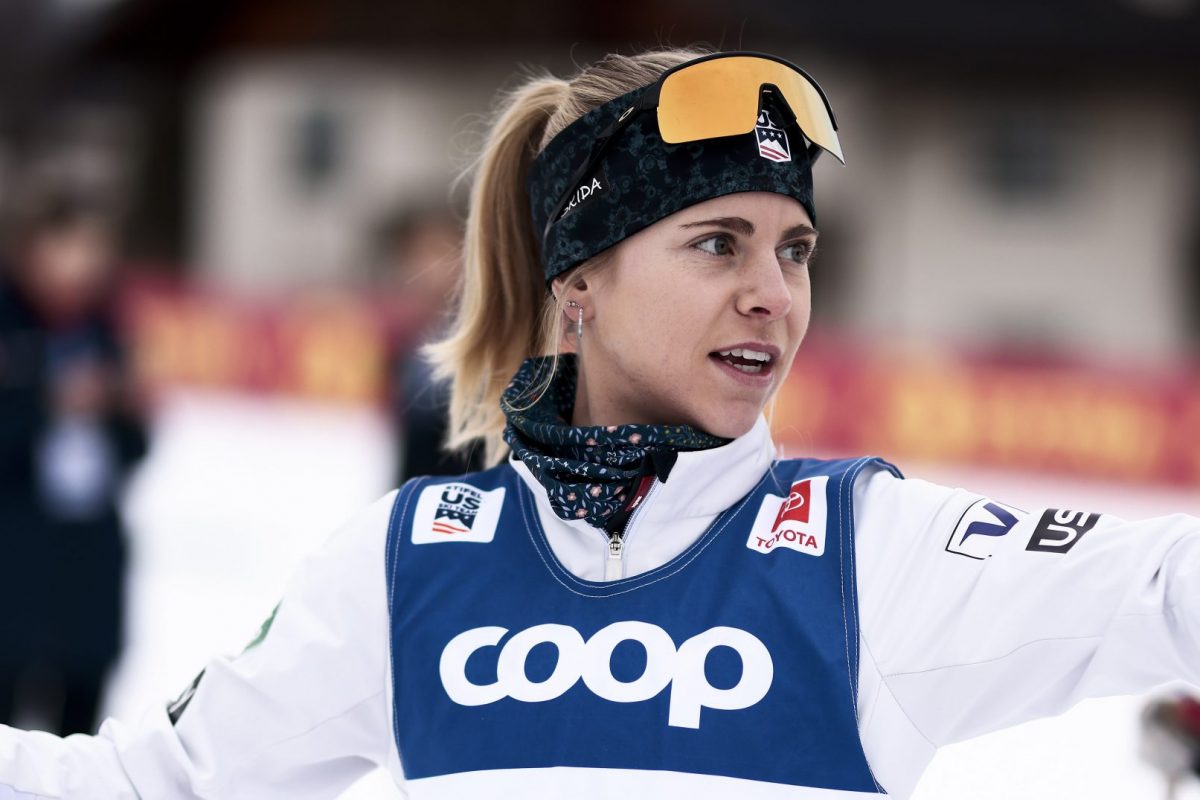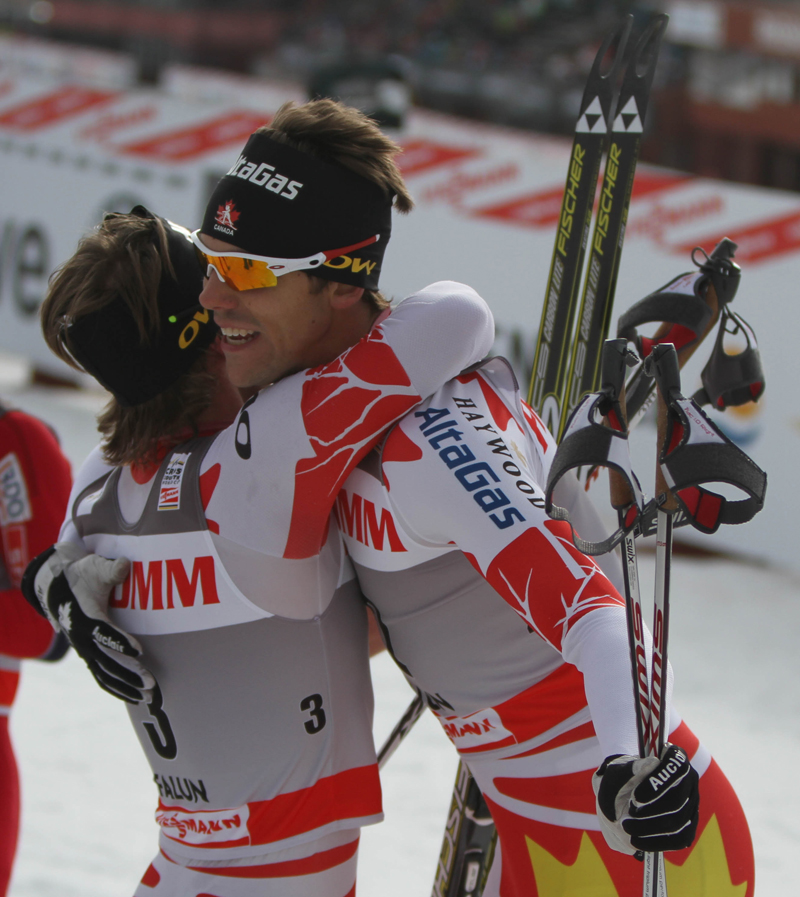
Sunday finally came.
Seventeen weeks and 120 days after the World Cup season started in Gällivare, Sweden, it ended in the same country with final pursuits in Falun.
While the big winners at World Cup Finals shed some tears and smiled for the cameras, the rest of some 50 men and 50 women clicked out of their race skis for the last time – for a while anyway.
For the six Canadians in Sunday’s freestyle races, the moment couldn’t have come soon enough.
“I felt like garbage warming up,” Kershaw said after finishing 4:27.4 minutes behind Norway’s Petter Northug, who won the 15-kilometer pursuit in 35:48.3 and wrapped up the overall World Cup title. “I was struggling with motivation, I’m not gonna lie.”
A year ago, Kershaw stood atop the podium on the last day of the 2011/2012 season as the overall World Cup runner-up. It was both a career best and a historic achievement for Canada, and it came with heightened expectations in the year that followed.
When Kershaw wasn’t winning, or at least living up to what he thought he was capable of, it made for some frustrating races.
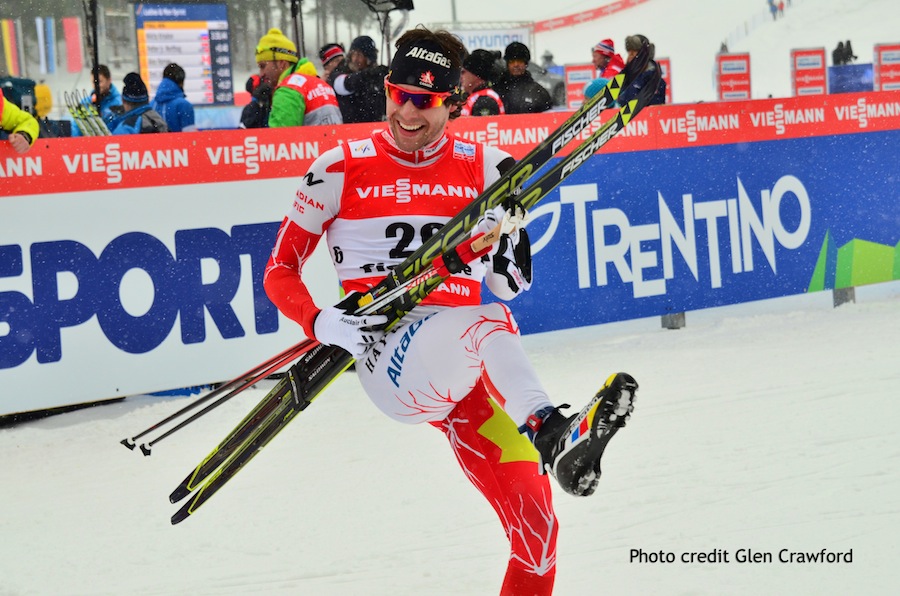
The 30-year-old wasn’t alone. A bronze medalist in the 2013 World Championships classic sprint, Alex Harvey seesawed between podiums and placing outside the top 30. Lenny Valjas came down with strep throat right before World Championships, and Ivan Babikov caught something similar not once, but twice, ultimately leaving him a “little flat,” as head coach Justin Wadsworth put it, at the end of the season.
On the women’s side, three members dwindled to two in February when Chandra Crawford cut her season short to recover leading up to the 2014 Sochi Olympics. Just before she left Europe, Perianne Jones and Dasha Gaiazova teamed up for bronze in the classic team sprint at the pre-Olympic World Cup in Russia. The medal gave them energy, but the two struggled in the World Championships sprints that followed.
At World Cup Finals last Wednesday through Sunday, Canada’s two Continental Cup leaders – Emily Nishikawa and Michael Somppi of the Alberta World Cup Academy –added some strength in numbers, but they were also feeling the wear of the season.
Nishikawa, 23, had done most every race at World Championships and been in Europe for more than a month. Somppi, 24, had been there since early March and was still pushing for his first World Cup top 30.
He didn’t achieve it Sunday in 47th (+9:28.6), but Somppi wrote in an email that he was getting close with the 37th fastest time.
“I felt OK, though certainly not great, as it’s been a long season with a ton of racing and it’s wearing on me,” Somppi explained. “The pace with the pack I skied with didn’t feel unreasonable and I felt pretty strong climbing.”
However, his best pair of skate skis – suited for cold weather – weren’t running well Sunday afternoon with temperatures above 6 degrees Celsius. That made him slow on the downhills.
“Unfortunately on the 3rd lap I was dropped pretty badly on the downhill coming into the stadium and I didn’t have it in me to close the gap,” Somppi wrote. “It was a tough experience being on the World Cup. I’ve learned some valuable lessons and become more comfortable with the racing environment so the next time I have an opportunity to race on the World Cup I will be better prepared.”
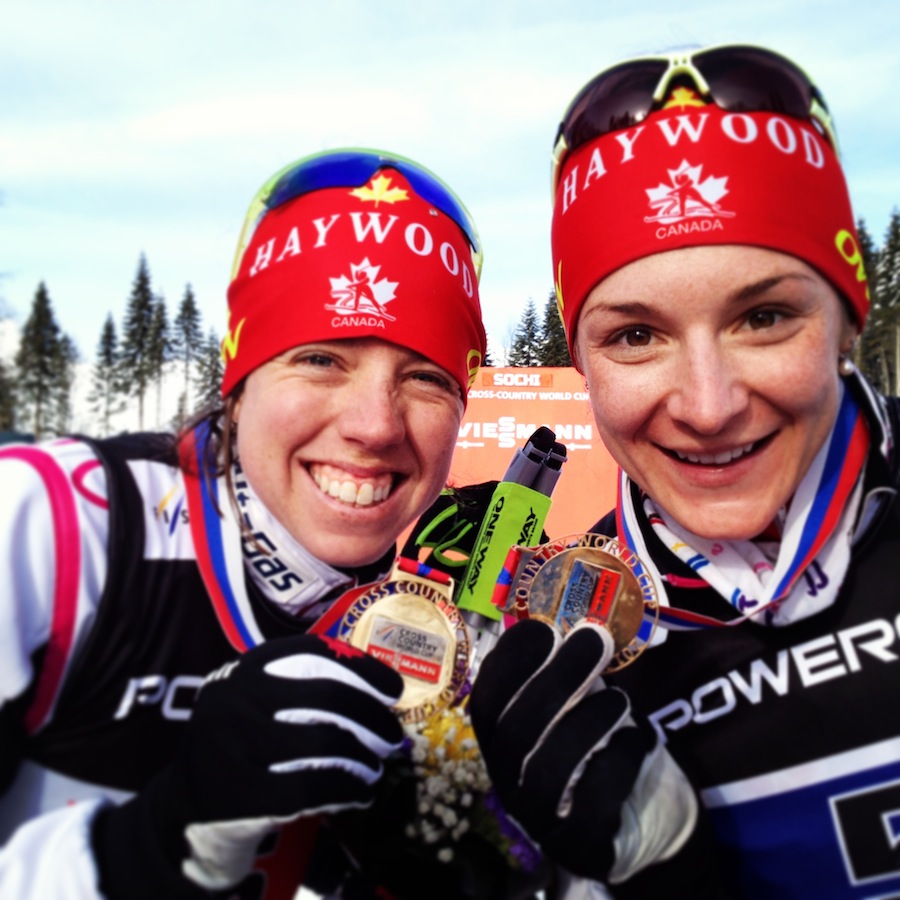
Somppi was the fourth-best Canadian in the 15 k pursuit after Harvey in 25th (+3:40.5), Kershaw in 31st, and Babikov in 41st (+5:39.9). Valjas finished last in 48th (+10.02.9). In the women’s 10 k, Nishikawa as the lone Canadian was 46th (9:56.4 behind Norwegian winner Marit Bjørgen). Gaiazova did not compete.
“She felt like she couldn’t race,” Wadsworth explained. “That’s her decision.”
As for the rest of his athletes: “They definitely went out there and skied hard,” he said. “Like I told them the last couple days, ‘I don’t care about the result, I just want to see you executing and focusing,’ and they did that and it was good.”
Good, not great, and certainly not what the Canadian World Cup Team had dreamed about before the start of the season. Given their starting positions on Sunday, with Harvey going earliest in 32nd, 3:16 behind Northug, the team knew miracles weren’t quite within reach. But as Kershaw pointed out, anytime you put a bib on, you have to go out there with some gusto.
“You’ve got to try to get yourself in the best possible frame of mind to give it your best shot,” Kershaw said. “Sometimes your best shot is 20 percent of what you’re capable of or what you’ve shown in the past.”
Regardless of where you end up, whether it’s first or 31st, Kershaw said that’s what motivates you to improve. However, at this point in the season, it was a matter of finishing it out. To add some lightheartedness to Sunday’s race, the Canadian men wore casual sunglasses.
“We still went hard, but we’re trying to find ways to still keep it fun,” Kershaw said. “It’s a beautiful life and ski racing is still a passion for everyone on the team, but it’s challenging. It’s not nearly as fun when you’re the one wiping the floor.”
Wadsworth believes that feeling is what will drive them in the year to come. Coming off an outstanding 2011/2012 outing, in which Kershaw was second and Harvey placed sixth overall and Valjas notched two podiums at World Cup Finals, he thinks the team might have been too ambitious to raise the bar higher.
“I think we came out of last year feeling like we could do anything, and that’s how we approached the whole training season and into the early part of race season,” Wadsworth said. “We were just like, hitting every World Cup and just plowing ahead. … We felt that we could train harder and do everything like more, more, more and we can’t.”
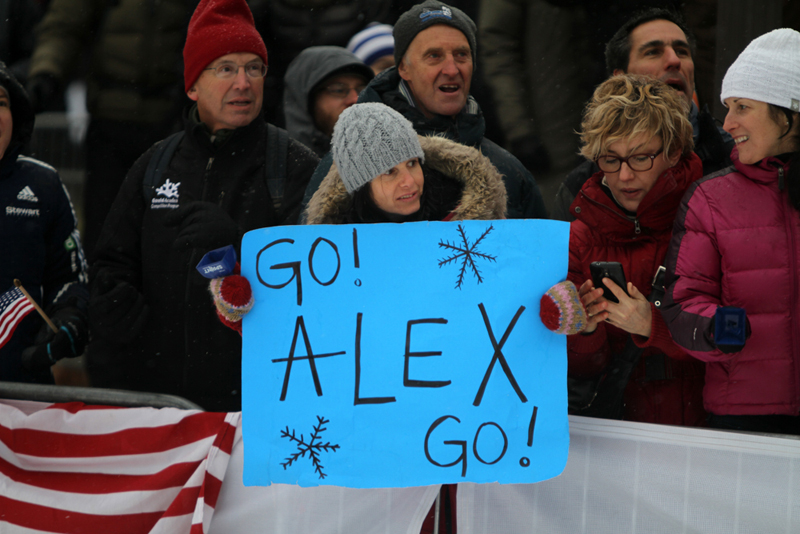
In the past, he said one of his program’s biggest strengths is its ability to carefully select races and get the most out of training camps and blocks throughout the year.
“It’s my fault for not skipping Kuusamo and Gällivare and just staying in Canada and preparing for the Canadian World Cups and then going on,” Wadsworth said. “Even I got sucked into it. We tried to go and do every race and it was just too much.”
In early December at the Quebec World Cup, Harvey was the only Canadian who qualified for the heats and ended up 21st in the individual freestyle sprint. The next week in Canmore, Alberta, Harvey and Kershaw placed outside the top 50 in the skate sprint qualifier and skipped the skiathlon the next day.
“We’ll be better. Canada will be better next year,” Kershaw resolved. “Five podiums just wasn’t what we were looking for this year. I think we all learned a lot this year and at the end of the day, that’s what skiing’s about.
“You’ve got to learn from your mistakes and move forward,” he continued. “We’re bummed that we’re not skiing well, but everyone is just so motivated to be better next year, and at the end of a long, tough season if everyone is still motivated, that’s a really good place to start.”
While the team had yet to debrief and set new intentions in its season-ending meeting, Wadsworth said they would look to change a few things next year, including their approach to testing skis.
Waxing woes were one reoccurring theme on the Canadian World Cup Team this year – with tough races at Holmenkollen and in the 15 k classic mass start in Falun last Saturday. Wadsworth said his small staff of five wax techs (eight at World Championships) shouldn’t bear the weight of the blame.
“We need to review our race-day testing,” Wadsworth explained. “I think the athletes realize, too, they need to take a little more ownership. A lot of times skis get tested for them, especially on skate days, so they can just kind of show up and focus on their warmup and whatnot, but I think they need to start testing and feeling the skis a bit more on their own and having more input on that. That will be something we do differently next year.”
Wadsworth would also like to hire another core technician, someone who could work more closely with his skiers and test right up until the start.
“You have to be pretty fit to ski even their warm-up speed,” he said. “The athletes need to take responsibility and come out earlier and take more time. You see a lot of the other countries doing that with their athletes, they’re out like an hour and a half before the race.”
After weathering a steep learning curve in 2013, Wadsworth’s confident it will bode well for the upcoming Olympic season.
“I think it will be really good to be flying under the radar because I know one thing and that’s both the men and the women on this team can win medals at the Olympics,” he said.
“We’re at such a high level that we feel like this year was kind of a failure, but at the same time, we got a medal at the World Championships and two fourth places, a near miss for another medal, as close as you can basically be and not get a medal,” he added, referring to Kershaw and Harvey’s fourth-place finish in the team sprint, three-hundredths of a second off the podium.
Wadsworth also pointed out the team’s four Tour de Ski podiums and the women’s team-sprint bronze on the Olympic course in Sochi.
“Those are solid and we need to remember those and remember the results from last year, too, and hold those in our pockets on the days when it gets hard training,” he said. “We learned a lot about the different athletes on the team and we’re going to use that to our advantage.”
The Canadian World Cup Team flew home Monday and most of its athlete will compete at Canadian Nationals in Whistler, B.C., this week. Kershaw planned to attend, but in need of some time off the skis, said he wouldn’t race. Harvey will not be there as he rehabs a shoulder injury from earlier this season in Sochi.
***
Alex Kochon
Alex Kochon (alexkochon@gmail.com) is a former FasterSkier editor and roving reporter who never really lost touch with the nordic scene. A freelance writer, editor, and outdoor-loving mom of two, she lives in northeastern New York and enjoys adventuring in the Adirondacks. She shares her passion for sports and recreation as the co-founder of "Ride On! Mountain Bike Trail Guide" and a sales and content contributor at Curated.com. When she's not skiing or chasing her kids around, Alex assists authors as a production and marketing coordinator for iPub Global Connection.

